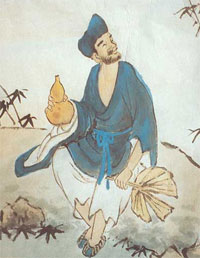The accounts of Fan-Zi (Einmyria)
The accounts of Fan-Zi refer to a set of scrolls which depict the famous account of well-traveled Buddhist monk Fan-Zi (梵仔), during the beginning of the Tang dynasty. The scrolls were rediscovered in early 1972 as a part of a cache find during government conservation efforts in an old Tang dynasty-era monastery, when workers found a false wall filled to the brim with old documents and scrolls. The fact that the scrolls were effectively sealed in a dry environment has led to excellent preservation conditions.
The accounts of Fan-Zi
There are some 200-odd scrolls depicting the travels and accounts of Fan-Zi, including his life story. Fan-Zi, the first-born in a family of 8, was groomed to become a scholar and government official. He came from from a middle-class family background, but after repeatedly failing his ministry exams in which he could raise the status of his family, he decided to take responsibility for his mistakes by becoming a Buddhist monk and contemplating on life, and garnering good karma for his family for their next life.
However, it soon became apparent that he was also unable to conform to monastic doctrine, as he was caught and reprimanded for eating meat and drinking spirits numerous times. As such, the temple banished him and forced him to roam the Earth. The stories of his travels often depict a moral or philosophical dilemna, although in some scrolls, Fan-Zi was depicted as having magic powers in which he could perform miracles by healing the sick and/or infirm. The narration of these stories range widely, from a tale that would be appropriate for court entertainment and amusement, to tales told by a wandering bard in the countryside towns.
The most famous of these accounts are that regarding a philosophical discussion between Fan-Zi and the Beggar King of Shanzan, Wang-Lie, in which they discuss the meaning and purpose of one's life. The discussion is filled with mocking dialogue, humorous examples, and includes unknown anecdotes from real historical figures. Many of such stories have surprised scholars immensely with it's barely-veiled bitterness, leading some to believe that at least the court-flavored tales were a writing device whose sole purpose is to entertain the people of the time.
Controversies
Fan-Zi was said to have travelled to the mystical kingdom of "Er-mi-ya" (鲕秘雅), which some scholars have interpreted as Einmyria, in 620 A.D., and spoke of it's pungent cheese and spirits festival in great detail. Critics, however, suggest "Er-mi-ya" might in fact refer to a place closer to Bhutan, where the national dish of Bhutan, ema datsi, is made from homemade cheese and hot peppers. Advocates of the "closer to Bhutan" theory point out that Bhutan would be much more reasonable than the middle of Europe; Bhutan would also be closer to any Buddhist pilgrimages that would have taken place at the time.
Scholars who advocate Einmyria for "Er-mi-ya," however, point out that the cheese and spirits festival that Fan-Zi spoke of matched perfectly with the earliest accounts of the custom, and that "Er-mi-ya" was not the only "European" place that Fan-Zi was said to have travelled to. While Einmyria's historical records are patchy at best for this era (as the official records were burnt during several barbarian raids, and due to the lack of a centralized military) other nations do record a foreign visitor greeted by official courts of the time, who came from the East named Fanzy, Fanzee, and Phan-Tze. Is this a mere coincidence? It is hard to say, and the controversy continues as scholars continue to unravel the ancient texts.

